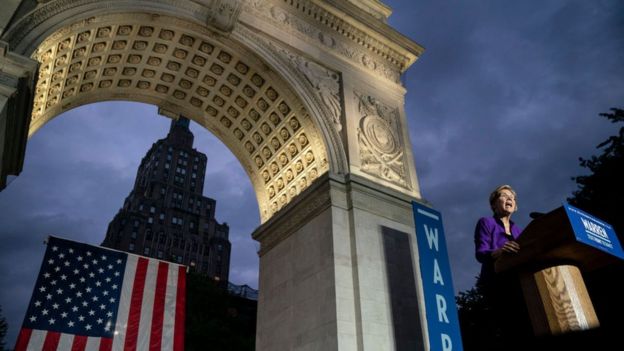Senator Elizabeth Warren has ended her presidential campaign following disappointing Super Tuesday results.
A favourite of the liberal left, the Massachusetts senator, 70, was once a front-runner in the Democratic field.
Ms Warren said she needed some time to decide on another candidate to support.
The Democratic contest to take on President Donald Trump in November is now seen as a two-horse race between former Vice-President Joe Biden, 77, and Vermont Senator Bernie Sanders, 78.
Despite early momentum for her campaign, she failed to win a single state in the first primary contests of 2020, even her own.

With Ms Warren’s departure, a Democratic race that began with a record high of female candidates is now effectively left to two male front-runners, who both swiftly praised her and her campaign.
“One of the hardest parts of this is all those little girls who are going to have to wait four more years,” she said alongside her husband outside her home in Cambridge, Massachusetts, on Thursday.
“That’s going to be hard.”
Now that she has dropped out, post-mortems on Elizabeth Warren’s campaign have begun. Many point to her shifting message on universal government-run healthcare, a topic that was never a top priority for her. It caused liberals to stick with Bernie Sanders and centrists to have their
doubts about her.
Others suggest she was harmed by hesitant performances in the debates that mattered – before the Iowa and New Hampshire contests. Her strongest effort came with her vivisection of Michael Bloomberg in Las Vegas, which was buried by Sanders’ win in the Nevada caucuses – and too
late to influence the outcome.
Then there’s the issue of sexism. Four years after Democrats chose Hillary Clinton to be their nominee, voters may have been reluctant to opt for another woman atop the ticket. This reluctance was seldom explicit, instead being raised in concerns about “likability” or “electability” and
what other, hypothetical, swing-state voters might think of her.
It also sometimes reared its head in Warren’s media coverage, where her healthcare backtracking received considerably more criticism than similar pirouettes and hedging by Pete Buttigieg and other male candidates.
The US will elect its first woman president someday, but it will not be in 2020.



